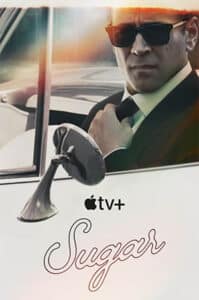
Something is slightly off about John Sugar, and it’s not (just) his doe-eyed, profoundly endearing humanity. By the time you get to the big twists of this unexpected, off-kilter detective gem from Apple TV+, whether you like the reveal won’t matter. Colin Farrell, as the titular character, will have you hooked.
Sugar, the latest Apple TV+ thriller with nods to various genres, curiously manages to subvert expectations by pulling the rug out from under your feet while playing many of its cards straight. Created by Mark Protosevich (I am Legend, Thor) and masterfully directed by Fernando Meirelles (City of God, The Constant Gardener), this eight-part series about an LA-based gumshoe (Farrell) getting in over his head may end up little more than the sum of its parts – but the parts are something to behold. In any case, it would be wise to approach Sugar as a bifurcated narrative and, hopefully, get something from either of its faces.
The first story is a by-the-numbers whodunnit with a splash of old Hollywood suave. Sugar opens in black and white with our eponymous hero in Japan, looking for the kidnapped son of a Yakuza. Effortlessly maneuvering a suspect, he instantly imposes himself as an eloquent polyglot, committed to finding the missing… without hurting anyone.
The scenery transitions to the general hyper saturation of Southern California, where Sugar casually liaises with his collaborator, Ruby (a playful Kirby Howell-Baptiste), before being summoned to the mansion of the elderly producer overlord Jonathan Siegel (James Cromwell). You guessed it, someone has gone missing. It’s Siegel’s granddaughter, Olivia (Sydney Chandler), an aspiring young artist with addiction issues; she’s known to “go rogue”, but this time seems different, and Siegel is certain something went awry.
Bizarrely, in his own family, Siegel is the only one to wonder where Olivia is. She’s been gone for weeks, after all. As Sugar acquaints himself with the Hollywood royalty and underbelly (the terms can often be used interchangeably) that is Siegel’s family, pettiness and resentment fly unchecked. Siegel’s son, Bernie (Dennis Boutsikaris), is a conceited womanizer with zero regard for his daughter’s well-being, while Davy, Bernie’s son and Olivia’s half-brother (a hilariously repulsive Nate Corddry), actively resents his sister and thinks only about reviving his dwindled career as a former child star.
Crossing paths with these folks doesn’t help with Sugar’s investigation but pulls him into exploitation, sexual harassment, and human trafficking intrigue. At least Jonathan has the redeeming quality of producing many of Sugar’s favorite films.
Not everyone in the family is reprehensible, however. Early on, Sugar tracks down the one, although former, Siegel, who genuinely cares about Olivia’s well-being. Melanie (a wonderful Amy Ryan), Bernie’s ex-wife and a washed-up rockstar, herself a recovering addict, appears to be the only person Olivia had a loving relationship with. Moreover, she looks like she knows more about the family than she lets on, her recent relapse a telltale sign of skeletons about to surface…
Ryan is movingly convincing as good-natured Melanie, somewhat hardened by time and Tinseltown’s cynicism but still in awe of life and people. “You’re not a douche,” she softly proclaims as she stares at Sugar, a curious statement aimed at a sophisticated handler of secrets working a lead.
She is right, though. Ultimately, Sugar’s tender relationship with Melanie forms the backbone of the show. The two team up in their pursuit of justice and disapproval of misanthropy, and it is damn exciting to finally watch a couple of kind, uncalculating leads just trying to articulate their place in an indifferent but menacing universe.
Sure, both Sugar and Melanie have secrets and anxieties they cling to, all of which prove vital to the story, no less, but the warmth and good nature with which they tackle the many obstacles around them are a bona fide spectacle in themselves. In an era of nasty men passing for “antiheroes” and female characters who serve no purpose other than to remind us how great or “tormented” the prestigious hero is, a genuine platonic friendship between two plain, nice (and both middle-aged!) people comes as a breath of fresh air in American television.
Sugar is as typical of a detective spiel as any (titular characters Perry Mason and Philip Marlowe come to mind). Olivia’s disappearance, of course, is not as straightforward as it seems, and multiple twists repeatedly turn the drama on its head until we reach a much broader context of political intrigue and class dynamics. On top of every bad guy, there is an even worse guy, and about halfway through, our affable protagonist won’t know what hit him. Everyone has something to hide, and all, including Sugar, are personally invested in ensuring certain outcomes. As I’ve said, thriller boilerplate.
That’s the crux of Sugar‘s first narrative strand, anyway. The other narrative, arguably the more compelling, centers on Sugar himself. Handsome, curious, and stylish to a fault, this guy appears like too much of a good thing and in a bizarrely stereotypical way. Like a walking ad for a movie star with preternatural talents, Sugar casually chats with a cab driver in Arabic, drives a Hockneyesque blue Corvette cabrio, wears exclusively tailored suits, and lodges in ritzy bungalows.
Sugar’s life as an in-vogue sleuth looks and feels like the stuff of noir and television classics, something the show’s aesthetic embodies with almost comical rigor. Languid, smoky jazz tunes, expansive landscape shots of Los Angeles, and Sugar’s own moody voiceover follow nearly every scene early on. He even eagerly poses as a movie buff, his posture and lines oft juxtaposed with inserts from the films of Humphrey Bogart and other trench-clad gentlemen.
Sugar works hard (and effectively) to envelop viewers in its smokescreens, making us wonder about Sugar’s mind and identity. Why is this guy obsessed with films and stereotypes? Why is he so invested in finding missing persons? Why does he care so much about not hurting anyone and being nice? The joke is on us for considering Sugar strange, but that’s how it is. Also mysterious are the frequent seizures he suffers from, tremors, palpitations, and loss of consciousness he is never keen to discuss. Why does he refuse to seek treatment?
Sugar’s immediate environment is just as puzzling. How can Ruby, presumably a PI handler, afford to live in a sizeable house in Silver Lake? Rather more worryingly, who does she work for, and why does she seem hellbent on steering Sugar away from the investigation into Olivia’s disappearance?
The questions keep piling up, but the ride you’re in for is smooth and masterfully executed. Analyzing Sugar meaningfully here would require spoiling its enormous reveal, which is out of the question; you will have to watch and see for yourself if the bait and switch is worth the buildup. In the spirit of fairness, it has to be acknowledged that the reveal in question is so substantial that it changes the paradigm of the entire experience, which will not be to everyone’s liking. It is all but certain that many viewers will feel “cheated” or let down by the thematic mashup taking place so late in the story, but the show’s strengths and fresh perspective make up for any potential shortcomings. In the worst-case scenario, allow yourself to be honestly surprised. Try as you may, and you will not guess what is going on by a long shot.
For those unsure of whether to invest their time in yet another mystery caper, there is plenty to look forward to in Sugar. The detective account is gripping, if not particularly innovative, the satire crisp, and the performances thoroughly engaging. The frisky classic television throwback aesthetic overcomes any potential embarrassment to land as a soothing balm for the tired viewer overwhelmed by the eternal metaphysical darkness of awards-bait thrillers with antisocial jerks for stars. That’s not to say Sugar doesn’t get brutally somber, but the hopeful outlook and benevolence give this story its real weight.
Farrell, a seasoned A-lister and heartthrob extraordinaire, shines in this starring role by effortlessly conjuring a deeply sympathetic character in awe of the world, mere months before he will go back into bloated prosthetic and malice for DC’s The Penguin (due to stream on Max this winter). Sugar’s relentless, almost childlike naïveté regarding the inner workings of our morbid society is an all-too-rare reminder that we do not need to stare into the proverbial abyss to realize that civilization is worth fighting for. Being hopeful and open is not antithetical to resourcefulness.
There is a scene early on in the series in which Sugar comes across a homeless man whose dog he will eventually inherit. Instead of falling back on liberal wealthy myopia of either playing unaware or tossing a coin or two at the man, after tasking the guy with watching his convertible for a wad of cash, he inquiries about his life and circumstance with genuine interest, urging the man to reconnect with his faraway sister and promising to help out financially.
This idealistic yet stubbornly consistent trait of Sugar’s is perhaps the best reason to stay with the show. Things (will) get bitter time and time again, but a true detective is the one who keeps believing not in his job but the people behind it. After all, when your own kin and community let you down, the kindness of strangers might glue society back together.


![Call for Papers: All Things Reconsidered [MUSIC] May-August 2024](https://www.popmatters.com/wp-content/uploads/2024/04/all-things-reconsidered-call-music-may-2024-720x380.jpg)



